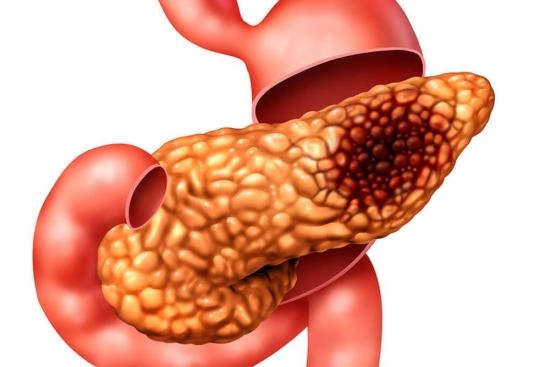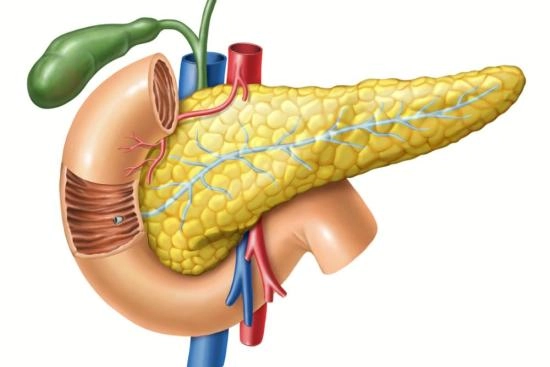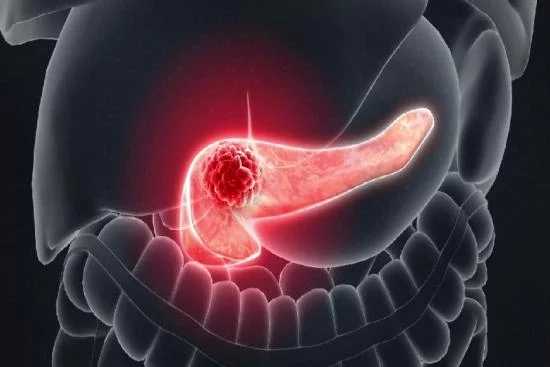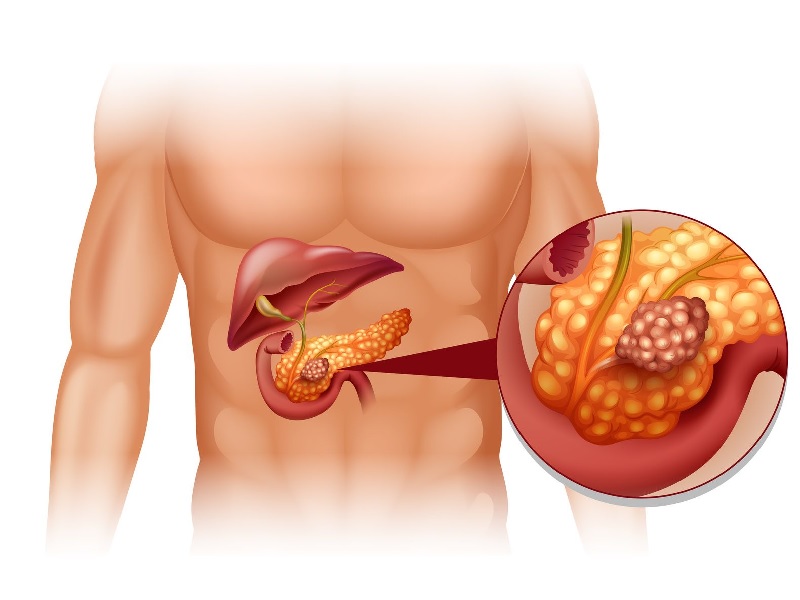The pancreas is an important gland located behind the stomach that plays a dual role in digestion and blood sugar regulation. It produces digestive enzymes to facilitate the assimilation of nutrients and secretes hormones, especially insulin, to regulate blood sugar levels.
Pancreatic cancer mainly affects the exocrine part of the pancreas, which is responsible for the production of digestive juices, and spreads rapidly to neighboring organs. It is a particularly aggressive disease that is often diagnosed at an advanced stage. However, thanks to medical advances in Turkey, new therapeutic approaches are improving treatment prospects and quality of life for patients.
Best Clinics with Verified Reviews

- Multispecialized hospital
- 7 operating rooms
- Capacity é of 170 beds

Symptoms of pancreatic cancer
Pancreatic cancer is often silent at first, making early diagnosis difficult. But early detection can save lives, especially if you have pancreatic cysts or a family history of the disease.
When the disease reaches an advanced stage, alarming symptoms begin to appear:
- Abdominal pain radiating to the back.
- Sudden weight loss or unexplained loss of appetite.
- Sudden onset of diabetes.
- Blood clots (thrombosis).
- Severe tiredness for no apparent reason.
- Jaundice (yellowing of the skin and eyes).
Alarmingly, 80% of cases are detected too late. Don't ignore these symptoms!
The earlier the cancer is detected, the better the chances of treatment. If you or a loved one have any of these signs, see your doctor right away.
Your health is precious; don't wait until it's too late. See a specialist today for a complete check-up!

Pancreatic cancer treatment options in Turkey
Pancreatic cancer is a complex disease that requires a multifaceted treatment approach. Fortunately, many options are available to combat this pathology and offer patients the chance of a cure or improved quality of life.
Chemotherapy and radiation therapy
Chemotherapy and radiation therapy are common treatments for pancreatic cancer. Depending on the stage of the disease, these treatments may be used alone or in combination to optimize outcomes.
- Neoadjuvant chemotherapy: Administered before surgery, neoadjuvant chemotherapy reduces the size of the tumor, making it easier to remove.
- Adjuvant chemotherapy: Used after surgery to eliminate any remaining cancer cells and prevent recurrence.
- Chemotherapy for metastatic disease: Used in advanced cancer to slow the progression of the disease.
In parallel, radiation therapy is often used to directly target the tumor and shrink it. When combined with chemotherapy, it becomes more effective, a treatment known as radiochemotherapy. This duo makes it possible to:
- Destroy cancer cells locally.
- Ease the pain of inoperable tumors.
The latest radiotherapy technologies, such as CyberKnife and proton therapy, offer greater precision and minimize side effects, opening up new prospects for patients.
Surgery for pancreatic cancer
Surgical treatment remains one of the most effective options, but may only be considered in the early stages of the cancer. Surgery removes the tumor and offers a potential cure. However, this solution is only applicable in 15-20% of cases where surgery is possible.
The two main surgical procedures are
- Whipple surgery: Partial resection of the pancreas and surrounding organs to treat pancreatic head tumors.
- Total or partial pancreatectomy: Depending on the extent of the tumor, more or less of the pancreas is removed.
Surgical decisions depend on the exact location of the tumor. Although this approach is often curative, it is also complex and requires a significant recovery period.

Targeted therapies and immunotherapy: the hopes of tomorrow
In Turkey, innovative treatments offer new options for pancreatic cancer patients:
- PARP inhibitors (olaparib): Used to treat certain pancreatic cancers associated with BRCA gene mutations.
- Immunotherapy: Although still in clinical trials, this approach holds great promise for the future of pancreatic cancer treatment.
These cutting-edge therapies aim to specifically target cancer cells while sparing healthy cells, offering new treatment options.

Palliative treatments
In advanced stages of the disease, treatment becomes palliative. The goal is to improve the patient's quality of life and manage symptoms, especially pain.
Palliative treatments include:
- Pain relief: Medications and procedures such as nerve blocks to relieve pain.
- Treatment of jaundice: By placing a biliary stent to unblock the bile ducts.
- Combating weight loss: Dietary supplements to maintain strength and vitality.
What factors affect prognosis?
The prognosis is based on the following factors
- The possibility of surgery: If the tumor is localized and can be removed surgically, the chances of a cure are greatly improved. However, if the tumor is inoperable, treatment options are limited.
- Cancer stage: The size of the tumor and its spread to other organs or lymph nodes have a direct impact on prognosis. Early diagnosis, when the cancer is still localized, offers many more treatment options and a more favorable prognosis than in advanced stages.
- The patient's general health: A patient in good physical health is better able to withstand severe treatments such as surgery, chemotherapy, or radiation.
- Type of diagnosis: first episode or recurrence: A newly diagnosed pancreatic cancer generally offers more therapeutic options than a recurrence, which is often more resistant to treatment. Early detection helps to better manage the disease and increase the chances of cure.
Our specialized centers in Turkey therefore focus on advanced diagnostic techniques to optimize the chances of therapeutic success.
Risks of surgical treatment
Surgery to remove pancreatic cancer offers a significant chance of cure, but like all surgical procedures, it carries certain risks. Here are the most important risks to consider:
- Bleeding and the possible need for a blood transfusion. These risks can be managed by your healthcare team.
- Infection, especially of the wound or lungs, may occur. Special antibiotics will be given to prevent or quickly treat such infections.
- Complications related to general anesthesia, including allergic reactions.
- Development of diabetes or steatorrhea (fat digestion disorders).
- Formation of pancreatic fistulas.
- Loss of pancreatic function, resulting in impaired absorption of nutrients.
Our accredited hospitals in Turkey use the latest technologies and world-class surgical expertise to effectively manage these risks. You will be cared for by experienced medical teams, ensuring high quality treatment in the best possible conditions.
Share this page
Pancreatic cancer, also called pancreatic adenocarcinoma, is cancer that affects the pancreatic gland. The reason this cancer is difficult to treat is because the pancreas is located near the stomach, liver, and intestine. Therefore, its symptoms are often difficult to interpret as they are confused with several diseases. Often, the disease is not detected until the metastasis phase.
Yes, if it is detected in the early phase.
Surgery is the main treatment for pancreatic cancer in our clinics in Turkey. However, surgical treatment is not possible for all patients. Chemotherapy or radiation therapy may, however, be possible.
Most pancreatic adenocarcinomas are the result of a mutation in the KRAS oncogenes (the genes that regulate cells division). These tumors are often surrounded by fibrous tissue which forms a barrier and prevents immune cells from attacking cancer cells. Therefore, both immunotherapy and targeted therapy are ineffective against pancreatic cancer.
Palliative care is treatment aimed at improving the quality of life of a patient with advanced cancer.






